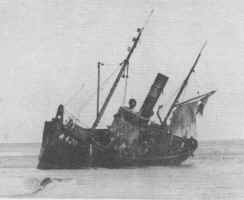|
"Winter's Fiercest Gales and
Blizzards -
Anti-Tank Ditches Hold Up Rescue Work In The North."
Few more difficult tests of physical endurance can be
expected at a wreck service than that experienced by the Wick Coastguard
staff and L.S.A. (Life Saving Apparatus) Company when the Aberdeen
trawler "Jean Stephens" was driven ashore at Sinclair Bay
during the fierce gale and blizzard on the night of January 18. Great
credit must also be given to the police at Wick and Reiss, some of whose
members are always ready to volunteer their services at a shipping
casualty, for their invaluable help in this occasion.
 |
(This picture is
reproduced from The
Coastguard magazine - with
kind permission.)
Another victim of the winter
storms, the Aberdeen trawler "Jean Stephens" ashore and
a total wreck at Sinclair Bay.
(Click on picture to enlarge.) |
The story begins when Mr. J.A. Addison, District
Officer, Wick, and a Coastguardsman started off by car with light rescue
equipment shortly before 10 p.m. on the five miles journey to Sinclair
Bay. Road conditions were terrible, and it was thought advisable to use
four vehicles to transport the main party of Coastguardsmen and the L.S.A..
Company who had turned out 13 strong.
As they made their way along the icy, snow-covered
road they could see the red flares being fired from the distressed
vessel, which marked her position near the Riess golf links. They got
their vehicles to within a quarter-of-a-mile of the wreck, but further
progress was halted by two deep snow-filled anti-tank ditches. There was
nothing for it but to man-handle the gear over the rough snow-covered
hummocks, steep frozen sand slopes, holes and pits, all made treacherous
by deep and drifting snow.
they found the "Jean Stephens" rolling
heavily in the surf, and the lifeboat attempting to reach her. The
rescue apparatus was assembled, but firing of the rocket was delayed
while the lifeboat made another attempt. At 11.30p.m. a line was fired
across the vessel, but owing to some misunderstanding by the crew the
whip was not hauled out. When the tide began to ebb the vessel ceased to
roll and although she had a heavy list to port, was in no immediate
danger. The gear was laid out for immediate use and the L.S.A. Company
stood by in case the wind caused the crew to abandon ship.
By 2.30 a.m. she was high and dry and the Coastguard
were able to assist the crew of eleven to leave the ship and help them
along the beach from where they were taken to the golf club house and
later to the Deep Sea Mission hostel at Wick. The skipper and mate
remained on board for another hour. Later the L.S.A. Company returned to
Wick leaving their gear in readiness for their return some hours later
when it was intended to attempt to refloat the ship.
The lifeboat also returned to port with a man, taken
from the British trawler "Strath Dee", who had suffered serve bruises
from a line-throwing rocket when attempting to make contact with the
"Jean Stephens" before the arrival of the L.S.A. Company.
During the whole of these operations the Coastguard and L.S.A. men
worked throughout the night without shelter of any kind against the
intense cold, gale force winds, and heavy snowfalls. The District
Officer and Station Officer L. Torne remained on duty locating as much
of the spare gear as was not covered under snowdrifts, intending later
to return to Wick for food and a change of clothing.
Later in the morning when it was obvious that weather
conditions would prevent any attempt to refloat the ship the District
and Station Officers with Coastguard and L.S.A. men returned to recover
the gear. Much of it had to be dug out of the snow, but the task of
getting everything back into proper order and serviceable condition was
carried out without any intervening rest period. But before they could
get away, their car was bogged down and a blinding blizzard developed
which virtually kept them prisoners in the car until the storm abated at
8.30 a.m. when they were able to walk back to the main road and get a
lift back to Wick where they arrived at 10 a.m.
A WELL EARNED COMMENDATION.
It was also reported in "The Coastguard" on page 34
that a commendation was earned. An exact copy of the report is below.
"Many calls from ships in trouble have been
answered but no really spectacular rescues can be reported. One which
looked as if it might result in a major services was the Aberdeen
trawler "Jean Stephens" which went ashore in Sinclair Bay,
about four miles from Wick. It was a bitter night; roads were icebound
and frequent squalls of heavy snow had to be contended with. And
to make matters worse the casualty was located on the beach which had to
be approached by way of sand dunes in which were the remains of
anti-tank ditches - remnants of the last war. The full story of
the casualty appears above so I will not repeat it, but I must state
that the Chief Inspector's letter of commendation to the staff and the
L.S.A. Company for their arduous work under conditions of extreme
hardship was thoroughly well earned."
|